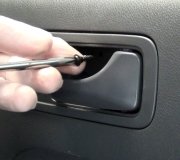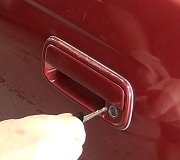There's two common causes of that noise. The first is stamped steel wheel covers that are sliding as the wheel flexes. A very light film of grease on the wheel will solve that.
The next thing to look at, or when you don't have steel wheel covers, is loose lug nuts. It can not be stressed enough how critical it is to use a click-type torque wrench when installing wheels. Under-tightening the nuts will not provide enough clamping force so the wheel will slide up and down. That will wear away the holes in the wheel and destroy the mating surface that holds the nuts tight.
Over-tightening the lug nuts, like we did years ago with impact wrenches, will also deform the friction surface on the wheel, especially with soft aluminum wheels. That can also cause them to work loose, but more commonly it will peel the threads on the studs and nuts. This is where a nut will bind and be impossible to remove. The mechanic trying to get the nut off gets blamed for somehow damaging it, but it was really the fault of the person before who put the nuts on too tight that is to blame.
Start by checking the lug nut tightness. Any tire and alignment shop will have a wall chart listing your car model and the correct torque. The only common specs I have memorized are for Chrysler products, but you can use this as a guide. For smaller front-wheel-drive cars, most of them call for 95 foot-pounds for steel wheels and 80 foot-pounds for cast wheels. If you find that retorquing the nuts stops the noise, the only correct repair is to replace the wheel and nuts. Both friction surfaces will have been ground away and the old nuts will never stay tight for long.
Another problem to watch out for is coatings on the studs. For domestic cars it is acceptable to use a very light film of grease on the threads to keep them from rusting, but "more" is not better. Some people heap on a pile of grease, then use air tools to run the nuts on. The grease will build up in front of the nuts, then centrifugal force will sling it out onto the friction surfaces. Those surfaces must remain dry because that friction is the only thing holding them tight. Use just a tiny hint of grease, then run the nuts on by hand.
If anyone ever used anti-seize compound on the studs, all hope is lost. Replace the wheel, studs, and nuts. If an inexperienced mechanic gets caught pulling that stunt, he might plead ignorance once and get a serious verbal warning, but guaranteed he will be fired for a second offense. There is no way the nuts will stay tight and no shop owner wants a lawsuit.
There's two other less-common things to look at. The wheel should have a center hole that exactly matches the hub. That holds the wheel centered so the lug nuts don't have to withstand those forces. Cast wheels often disintegrate in that area. You may be able to save the wheel by cleaning off all the corrosion that sticks to the hub, then use some grease for that center hole only. If nothing has helped so far, check the torque of the axle nut. That nut holds the wheel bearing together and must be very tight to prevent the bearing from becoming noisy. A common torque spec for that nut is 180 foot-pounds, but some cars call for as much as 240 foot-pounds. That's a bunch, and you'll never get close to that if you're going by feel.
Finally, all import cars, and now most domestics have anodized wheel studs. That is an electroplated coating that is a lubricant. No grease of any kind must ever be used on those. You can identify those studs by their light blue, light yellow, or silver color. Grease will melt that coating over time and can cause the nuts to seize. It will also cause the nuts to bind and it's not unheard of for a stud to snap when trying to remove the nut.
Thursday, June 16th, 2016 AT 8:22 PM


